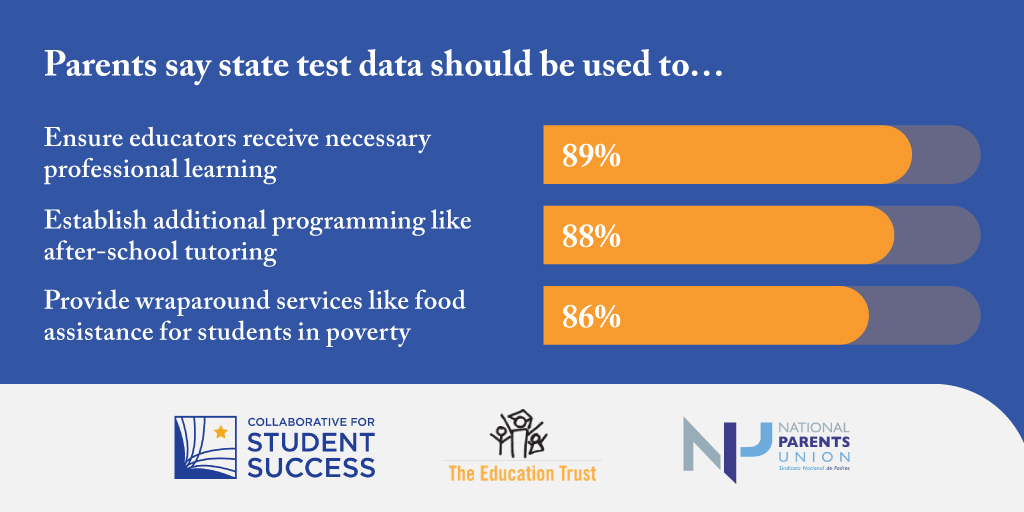Parent Support for Assessments Grows When K-12 Leaders Show How Data Helps Schools and Students
Study shows strong bipartisan support for the use of statewide standardized assessments to measure academic performance and provide targeted supports
WASHINGTON (June 25, 2024) – A new poll paints a clear picture that parents strongly support the use of statewide summative assessments to measure student progress, yet too few K-12 leaders are clearly sharing how results are used to drive interventions and resources in schools.
Two years ago, an EdTrust analysis found a pervasive and harmful disconnect between policymakers and parents: School leaders stated that they used assessment data to make critical decisions about how resources were distributed amongst and within schools, but families were often in the dark about how assessment results helped target supports and programs for the students most in need.
EdTrust, in partnership with the Collaborative for Student Success, set out to bridge this disconnect through a qualitative study of district leaders across the country. The results of that study were used by the National Parents Union to survey 1,518 parents in early May to better understand how parents perceive the use of assessment data in schools.
The response was loud and clear. Across demographics and political ideology, parents overwhelmingly support the use of assessment data to drive resources to the schools and students with the greatest need.
“Parents and educators deserve to know how statewide tests are improving education for their children. Without clear examples of how leaders use the results on behalf of schools and kids, assessments can seem like a burden, instead of a critical tool. We set out to correct that misperception,” said Jim Cowen, executive director of the Collaborative for Student Success. “We are encouraged to see strong support for statewide assessments – more than 75% of parents across the ideological spectrum value assessments to measure academic performance – parents clearly want to see this data used to inform resource allocation decisions.”
More than eight in 10 parents agree that assessment data should drive actions that help students, including ensuring educators receive necessary professional learning (89%), establishing additional programming like after-school tutoring (88%), and providing wraparound services like food assistance for students in poverty (86%).
“Parents and caregivers want to understand the information provided from statewide assessments to know how their schools are faring and how this data is being used to guide school leaders’ decisions that support their children’s academic growth, but unfortunately, too many parents are left in the dark about how these decisions are made,” said EdTrust’s president and CEO, Denise Forte. “This research shows why it is important that school and district leaders actively and authentically engage with parents and caregivers. When they do so, communities can better understand what’s most effective in accelerating student learning, where there’s room for improvement, and how to work in partnership with schools.”
Over two-thirds of parents were very likely to engage with their child’s school about the use of data through various strategies including completing surveys (82%), attending monthly meetings (69%), and joining parent advisory councils (64%).
“Parents have shown a strong desire for assessment data to be actionable,” said Keri Rodrigues, president of the National Parents Union. “Even among parents who are unsure of the value of statewide assessments, when they know how the data is being used to give resources to struggling students, the value grows by nearly two-thirds.”
The data about parents’ beliefs was included in a larger poll released by the National Parents Union on June 13. Results of that poll can be found here.
EdTrust will release the qualitative study results later this fall.


